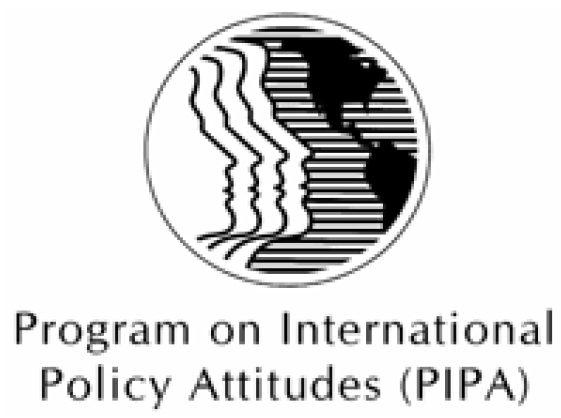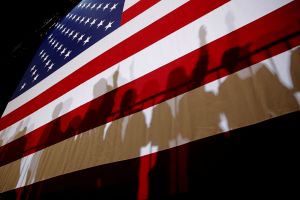The 2005 Chicago Council Survey explored public opinion on democracy promotion post-September 11 world as one of the core principles of US foreign policy.
Americans on Promoting Democracy
Introduction
Democracy promotion has emerged in the post-September 11 world as one of the core principles of US foreign policy. While the United States has historically paid lip service to the goal of democratization, this was typically counterbalanced by the perceived need to maintain good relations with non-adversarial authoritarian states in strategic areas. This debate has been recast in the last several years in light of the emerging view that the United States can no longer ignore the authoritarian nature of many governments, particularly in the Middle East, whose lack of political and economic freedom is seen as contributing to religious radicalism, support for terrorist groups and anti-Americanism. President Bush, in his 2005 State of the Union Address, committed the United States to an active democratization program aimed at ending tyranny in our world.
Many who advocate for active US efforts in democracy promotion see it both as the bedrock of the US political system and a universal value that can be successfully transplanted in virtually any country or region. The current test case for this is Iraq. The US has stated that the Iraq War was justified on the grounds of removing Saddam Hussein’s tyrannical regime and replacing it with a democratic alternative and has committed substantial resources to democratizing the country. The hope is that a viable democracy in Iraq will stabilize the country and assist in spreading liberal political values to other Middle Eastern states, thereby undermining support for terrorism and making the US more secure.
The present difficult situation in Iraq, however, has underscored the complexity of imposing democracy on states with little or no experience with it and brings into question the role democratization should play in US foreign policy, the benefits it brings to the United States and the extent to which democratic processes must originate from within. There are fundamental questions about whether democracy should be viewed as a universal value, whether the United States should universally promote it and if so whether it should use coercive tactics such as military force.
Public attitudes on these issues will impact the policy direction the United States takes. If Americans believe that the United States should play an important role in pushing democratization and that these efforts make this country and the world safer, then the US government will have a greater mandate to undertake active democratization initiatives. If instead Americans question whether there is a real democracy dividend due to the lack of universal applicability of democratic principles or to what the United States can accomplish on its own, there will likely be pressure to scale back what we do and focus on non-coercive forms of pressure and encouragement.
In order to shed further light on American attitudes on these critical issues, The Chicago Council on Foreign Relations and the Program on International Policy Attitudes conducted a poll September 15-21 with a nationwide sample of 808 Americans (margin of error was +/- 3.5-4.0%) depending on the sample size for each question. The poll was fielded by Knowledge Networks using its nationwide panel, which is randomly selected from the entire adult population and subsequently provided internet access. For more information about this methodology, go to www.knowledgenetworks.com/ganp.
Key Findings
Promoting Democracy with Military Force
A majority rejects the idea of using military force to promote democracy, whether by overthrowing dictators or threatening countries with military force if they do not institute democratic reforms
Iraq War
A large bipartisan majority says that establishing a democracy was not a good enough reason to go to war in Iraq. The experience in Iraq has made Americans feel less supportive of using military force to bring about democracy. A majority is ready to accept an Iraqi constitution even if it does not fully meet democratic standards, and wants to start withdrawing troops once the constitution is ratified.
Benefits of Democracy
Americans are not convinced that when there are more democracies the world is a safer place, and are divided about whether democracy undermines support for terrorist groups, or whether democracies are less likely to go to war with each other or more likely to be friendly to the US. While a very large majority believes that democracy is the best form of government, there is less confidence that it is best for all countries. Republicans are a bit more convinced of the benefits of democracy, but only by a few percentage points.
Democracy as a Priority in US Foreign Policy
In general, a majority thinks that promoting democracy should be a goal of US foreign policy, but not a top priority, and favors a pragmatic approach: actively promoting democracy in some cases but not others. While a majority thinks that the US should be supportive of Saudi Arabia having free elections even if it is likely that the elected government would be unfriendly, a majority does not think that the US should promote a country becoming a democracy if it is likely to bring Islamic fundamentalists to power. The public is divided on whether the US should pressure Pakistan to hold elections.
Promoting Democracy with Diplomatic and Cooperative Methods
A large majority favors the US promoting democracy through diplomatic and cooperative methods including helping emerging democracies with aid and technical assistance in conducting elections, sending monitors to certify that elections are conducted fairly and honestly, and bringing students, journalists and political leaders from a variety of countries to the US to educate them on how democracy works. However, a majority opposes using punitive or assertive methods for pressuring countries to become more democratic such as economic sanctions and supporting dissidents. Support for using aid as a reward is high, but not for withholding it as a punishment, whether the aid provider is the US government or the World Bank.
Working through the UN
A large majority prefers working through the UN to promote democracy. A plurality believes that it should be the goal of the UN to promote democracy in the world.
Pressing for Human Rights
In contrast to more divided attitudes about pressuring countries to be more democratic, large majorities favor the US putting diplomatic pressure on governments to respect human rights, speaking out against human rights abuses, and encouraging other countries to do the same.
Reservations about US Democracy
Some of the reservations Americans have about pressing countries to become more democratic may be derived from a lack of confidence that the US is an ideal democracy. Americans are clearly not satisfied with the level of US government responsiveness to the will of the public.

